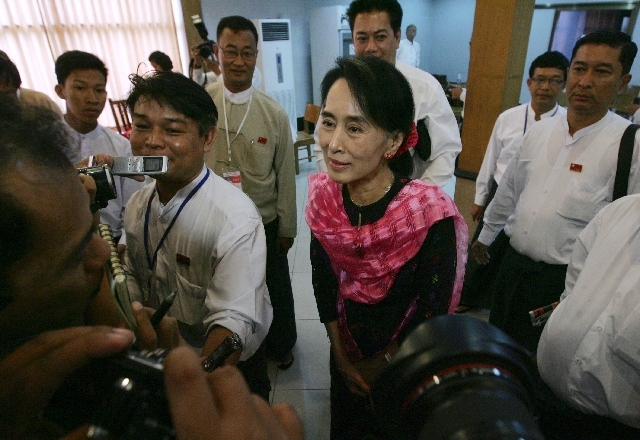Myanmar’s Suu Kyi slams 2-child limit for Muslims

YANGON, Myanmar — Opposition leader Aung San Suu Kyi and Islamic leaders expressed dismay Monday over plans by authorities in western Myanmar to revive a two-child limit on Muslim Rohingya families, a policy that does not apply to Buddhists and comes amid accusations of ethnic cleansing.
Some Buddhists, however, welcomed the plan for addressing their fear of a Muslim population explosion.
Authorities in strife-torn Rakhine state said this past weekend that they were restoring a measure imposed during past military rule that banned Rohingya families from having more than two children. Details about the policy and how it will be enforced have not been released, sparking calls for clarity and concerns of more discrimination against a group the U.N. calls one of the world’s most persecuted people.
“If true, this is against the law,” said Suu Kyi, the opposition leader and Nobel Peace Prize laureate. Suu Kyi has faced criticism for failing to defend the Rohingya following two waves of deadly sectarian violence last year. She told reporters she had not heard details of the latest measure but, if it exists, “It is discriminatory and also violates human rights.”
The policy applies to two Rakhine townships that border Bangladesh and have the highest Muslim populations in the state. The townships, Buthidaung and Maungdaw, are about 95 percent Muslim. Nationwide, Muslims account for only about 4 percent of Myanmar’s roughly 60 million people.
The order makes Myanmar perhaps the only country in the world to level such a restriction against a particular religious group, and is likely to bring further criticism that Muslims are being discriminated against in the Buddhist-majority country. The central government has not made any statement about the two-child policy since Rakhine state authorities quietly enacted the measure a week ago. Calls seeking comment from government spokesmen have not been returned.
Longstanding antipathy toward the Rohingya erupted last year into mob violence in which Rakhine Buddhists armed with machetes razed thousands of Muslim homes, leaving hundreds of people dead and forcing 125,000 to flee, mostly Muslims. The New York-based group Human Rights Watch has accused the government and security forces in Rakhine of fomenting an organized campaign of “ethnic cleansing” against the Rohingya, who are regarded as aliens.
Since the violence, the religious unrest has expanded into a campaign against Muslim communities in other areas, posing a serious challenge to President Thein Sein’s reformist government as it attempts to implement democratic reforms after nearly half a century of harsh military rule.
Rakhine state spokesman Win Myaing said over the weekend the policy was meant to stem population growth in the Muslim community, which a government-appointed commission last month identified as one of the causes of the sectarian violence. He said authorities have not determined how the measure will be enforced, but it will be mandatory.
“This is the best way to control the population explosion which is a threat to our national identity. If no measure is taken to control the population, there is a danger of losing our own identity,” said National Affairs Minister for the Yangon Region Zaw Aye Maung, an ethnic Rakhine member of parliament. He said restricting the number of children in the poorer Muslim community will benefit them because smaller families are better able to feed, clothe and educate their children.
A Buddhist monk in Maungdaw township was also enthusiastic.
“It’s a good idea. If the government can really control the Bengali population in the area, the other communities will feel more secure and there will be less violence like what happened in the past,” said monk Manithara from the Aungmyay Bawdi monastery, using the name “Bengali” that most Buddhists prefer to “Rohingya.” “It’s also a good step to develop the living standards of the people in the region. China also has this kind of policy.”
China has a one-child policy, but it is not based on religion and exceptions apply to minority ethnic groups.
“This restriction violates human rights,” said Nyunt Maung Shein, head of Myanmar’s Islamic Religious Affairs Council. “Even if it existed under the military regime, it should be considered inappropriate under the democratic system.”
“The authorities should be very cautious,” he said. “If this is a step to ease tension between the communities, it will not produce the desired effect.”
Myanmar’s government does not include the Rohingya as one of its 135 recognized ethnic minorities. It considers them to be illegal immigrants from Bangladesh and denies them citizenship. Bangladesh says the Rohingya have been living in Myanmar for centuries and should be recognized there as citizens.
For years, the Rohingya in Myanmar have faced a variety of heavy-handed restrictions. They needed permission to travel outside their villages, couples were required to have permission to marry, and were then limited to having two children. Any offspring that exceeded the regulation were “blacklisted” and refused birth registrations, and denied the right to attend school, travel and marry, according to a report by the Arakan Project, a Thailand-based advocacy group for the Rohingya.
Phil Robertson of Human Rights Watch called the development “outrageous,” noting that the commission’s report stated that any form of population control must be “voluntary” and conform to human rights standards.
“This is a step precisely in the wrong direction – going exactly the wrong direction from reconciliation and respect for human rights,” he said.












